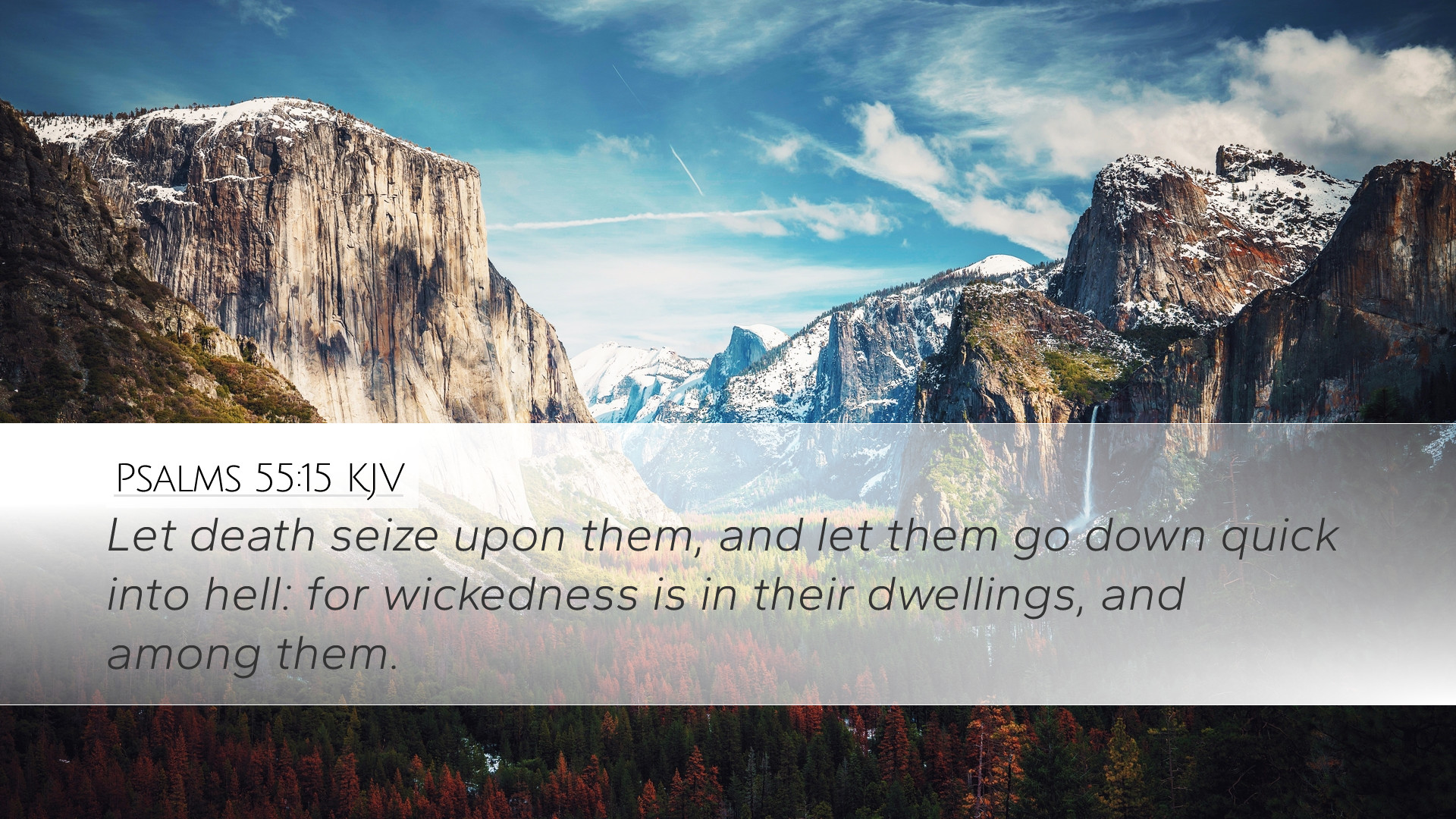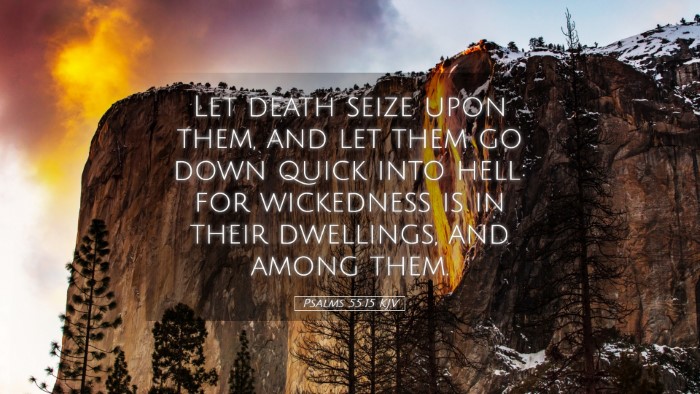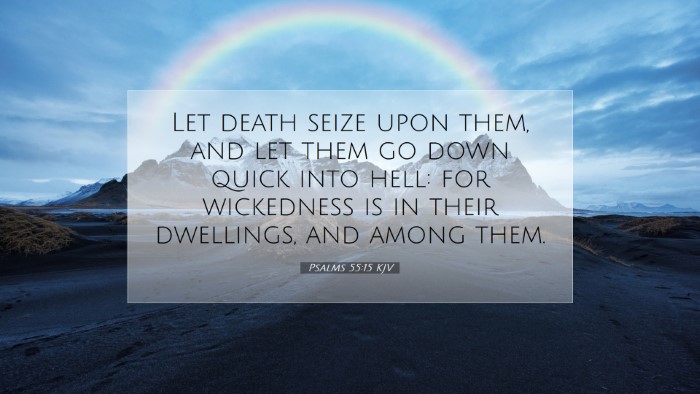Commentary on Psalms 55:15
Verse: Psalms 55:15 - "Let death seize upon them, and let them go down quick into hell: for wickedness is in their dwellings, and among them."
Introduction
The Book of Psalms is one of the most profound expressions of human emotion and divine relationship. Among its verses, Psalm 55 is particularly poignant, reflecting deep feelings of betrayal and anguish. In verse 15, the psalmist expresses a desperate plea for justice against the wicked, illustrating the dynamic of suffering and the desire for divine retribution.
Contextual Overview
This psalm, traditionally attributed to David, arises from situations of distress, likely during a time of betrayal by a close acquaintance. It encapsulates the turmoil of the heart when faced with treachery. The language used demonstrates the intense emotions David experienced, revealing not just personal sorrow but also a broader implications regarding divine justice.
Exegesis and Insights
-
Reflections on Wickedness
Matthew Henry notes that the psalmist acknowledges the reality of wickedness present not only in the actions of individuals but also permeating their surroundings. The phrase “wickedness is in their dwellings” implies that sin and moral decay can infiltrate communities, suggesting a cancerous effect of evil that requires divine intervention.
-
A Cry for Justice
Albert Barnes emphasizes the psalmist's passionate appeal for God’s justice. In his context, the invocation of death and hell upon the wicked illustrates not a desire for personal vengeance but a longing for fairness within God’s kingdom. Barnes reminds us that the strong wording reflects the depth of pain that betrayal can inflict, indicative of a faithful servant's heart longing for righteousness.
-
Understanding Divine Sovereignty
Adam Clarke discusses the theological implications of the psalm. He suggests that the psalmist, in the face of his anguish, places his trust in God’s ultimate authority. The desire for retributive justice speaks to a deep-seated belief in God’s holiness and the conviction that all wrongs will one day be righted. Clarke points out that this reflects a broader biblical theme where the faithful cry out to God for vindication against wrongdoers.
-
The Role of the Community
Each commentator addresses the collective aspect of sin mentioned in this verse. Henry posits that such evils can corrupt entire communities, emphasizing the need for spiritual vigilance among believers. The psalmist's lament highlights how the actions of individuals can reverberate through their societal networks, calling for both personal piety and corporate repentance.
-
Theological Implications of Judgment
Barnes interjects a notable caution in interpreting the psalm as a literal desire for the destruction of one's enemies. Instead, he encourages understanding it as a metaphorical expression of the longing for God to deal with evil decisively, echoing the belief that God’s righteous judgment is necessary for the establishment of justice.
-
Historical Context
Henry provides insight into the historical context of this plea. Given the period of David’s life when he may have experienced betrayal from those close to him, the intensity of the verse speaks profoundly to the human condition. The verse stands as a timeless reminder that the struggle against wickedness is universal and that believers can seek refuge in God during tumultuous times.
Practical Applications
-
Trusting in Divine Justice
This verse serves as a potent reminder for pastors and theologians about the importance of trusting in God’s justice. Even when faced with deep personal betrayal or societal injustices, the faithful can find solace in the belief that God sees and will act at the appropriate time.
-
Prayers for Righteousness
Students of Scripture can use this psalm as a model for approaching God with honesty about their hurt and a desire for justice while being mindful of their own need for grace. This encourages believers to make their petitions known, paralleling David's raw expression of feeling.
-
Awareness of Community Health
Understanding the communal aspect of wickedness can prompt local churches to engage in self-examination and accountability, knowing that the collective behavior can lead to a significant spiritual decline within the congregation.
-
Encouragement in Suffering
This passage offers hope for those experiencing betrayal or suffering unjustly. It encourages individuals to voice their grievances to God while reaffirming their trust in His ultimate plan and timing.
Conclusion
Psalms 55:15 remains a deeply moving plea for justice amidst betrayal and wickedness. Through the insights gleaned from renowned commentaries, we gain a richer understanding of the emotional and theological depth contained within this verse. It serves as a guiding light for believers, inviting them to grapple with their feelings of hurt while fostering the hope that divine justice will prevail in God's perfect timing. The church is called not only to recognize the reality of evil but to stand firm in prayer and faith, knowing that God is ultimately sovereign over all circumstances.


